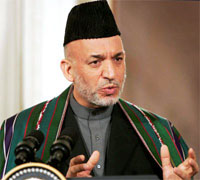Hamid Karzai, incumbent and front-runner
 Kabul - Hamid Karzai, the US magazine Newsweek wrote in December 2001, had the "toughest job in the world."
Kabul - Hamid Karzai, the US magazine Newsweek wrote in December 2001, had the "toughest job in the world."
The Pashtun politician had just been chosen - in absentia - to serve as Afghanistan's transitional president at an international conference held in Germany.
At that time, Karzai was in southern Afghanistan, negotiating with the Taliban, who had ruled the country on the Hindu Kush since 1996, to relinquish their last stronghold in Kandahar.
Despite several assassination attempts, and also growing discontent with his government among the Afghan people, Karzai is running again in the August 20 presidential election.
Notwithstanding the mounting criticism, Karzai is believed to stand a good chance of winning another term after his triumphal win in the 2004 election, the first free presidential poll in the country.
His victory seemed assured largely because Karzai can firmly count on many votes from the Pashtun, Afghanistan's largest ethnic group.
But his challengers accused the incumbent of abusing the government's power and resources for his campaign.
Karzai succeeded in persuading several candidates to pull out of the race, probably not without promising some compensation after he secures an election win.
Furthermore, he managed to get Mohammad Kasim Fahim of the opposition Northern Alliance on his side, making the warlord his running mate.
Issues have taken a back seat in the Afghan campaign. What counts most is to gain the support of the country's tribal leaders.
Karzai has not laid out any grand vision on how to solve Afghanistan's most pressing problems.
At a recent rally, he vowed to push ahead with the so-far unsuccessful process of reconciling with the Taliban. He also said he was to call a grand tribal assembly, or loya jira, to thrash out a "new agreement" with the international forces in Afghanistan.
"The host and the guest should know who is the guest and who is the host," the president said.
Yet without the foreign soldiers protecting his unstable government, Karzai would have lost power a long time ago. Despite the troops, Karzai's influence is limited, in particular in the insurgency-ridden provinces in the south and east.
The 52-year-old president, who is married to an Afghan doctor, mostly stays put in the presidential palace in Kabul, and is largely isolated from the Afghan people.
The international community is growing increasingly critical of Karzai, who was once viewed as Afghanistan's beacon of hope and one of the most fashionable men in the world.
His detractors regard him as a puppet of the US government, but relations with Washington have cooled considerably since US president George W Bush left office.
A new US government white paper on US policy toward Afghanistan and Pakistan summed up the crux of the issue: "The overall legitimacy of the Afghan government is also undermined by rampant corruption and a failure to provide basic services to much of the population over the past seven years."
While President Barack Obama has made Afghanistan his top foreign policy issue, neither he nor Secretary of State Hillary Rodham Clinton have paid Karzai a visit so far.
Yet for a long time, Karzai was regarded as the West's best hope. Although Western-oriented, Karzai is also steeped in the traditions of his country and is able to converse easily in English as well as his native Pashtun.
Karzai completed his formal education in India in 1983, moved to Pakistan and joined the resistance against the Soviet occupation of Afghanistan.
After the Red Army's defeat, Karzai, who calls himself a "devoted Muslim and Afghan patriot," became deputy foreign minister.
He resigned in the mid-1990s at the beginning of the civil war, and when the warring mujahedin reduced Kabul to debris, he was one of the first to support the Taliban but quickly became disillusioned.
Not only his anti-Taliban stance but also the fact that Karzai was never one of the warlords who terrorized the country seemed to make him a suitable candidate for the presidency after the 2001 ouster of the Taliban.
However, Karzai far from fulfilled the expectations set for him. Both in Afghanistan and the West, people increasingly wonder whether this president is not the hoped-for solution for Afghanistan but rather part of the problem. (dpa)